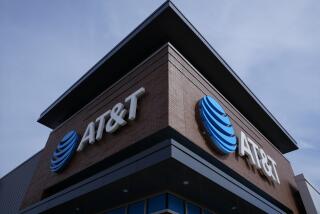Will AT&T; customers get satisfaction from merger?
Pop quiz: Name the telecom company whose wireless service is rated dead last for customer satisfaction and has been dubbed “worst carrier” by Consumer Reports.
If you guessed AT&T, go to the head of the class.
So does anyone think things will improve if AT&T Inc. wins federal approval to acquire rival T-Mobile USA for $39 billion, giving it more wireless customers than any other service provider?
“What improves customer satisfaction is when carriers compete with each other,” said Parul Desai, telecom policy counsel with Consumers Union, publisher of Consumer Reports.
“When you combine carriers that had been competing with each other, it’s hard to see how customer satisfaction will improve,” she said.
Desai noted that T-Mobile placed only a few notches higher than AT&T on Consumer Reports’ rankings, which judged wireless service providers on such factors as overall value, voice service, data service, phone support, staff knowledge and resolution of issues.
U.S. Cellular was rated the best carrier for customer satisfaction, followed by Verizon Wireless and Sprint Nextel.
If the merger passes regulatory muster, a combined AT&T and T-Mobile would have about 130 million subscribers, vaulting past Verizon’s 94 million customers. Sprint would be a distant third (and a probable takeover target for Verizon).
For consumers, it’s the classic merger conundrum: How can service improve and prices go down with fewer competitors in the market?
Pick an industry — telecom, cable, banking, healthcare. Is there a single instance of service and prices improving for consumers as a result of a big-ticket merger?
I can’t think of one. Maybe you can, and I’d love to hear about your experience. But I’m drawing a blank.
John Britton, an AT&T spokesman, told me that consumers will definitely benefit from the company tying the knot with T-Mobile. He said the combined company would boast more wireless spectrum and cellphone towers, which would improve its coverage area and reliability.
Britton acknowledged that some might see AT&T’s wireless service as, well, lacking, particularly in light of complaints that the company’s network came up short in handling the high-bandwidth needs of iPhone users.
“We are out to change that perception,” he said. “We are focused on providing outstanding customer service. People have choices, and we want them to choose AT&T.”
That’s the thing, though. People have relatively few choices when it comes to telecom, and the ongoing wave of consolidation in the industry means that with each passing merger, there’s one fewer alternative for consumers to turn to.
Meanwhile, the regulatory landscape continues to evolve. In 1996, the Federal Communications Commission deregulated phone companies in hopes of fostering increased competition.
What we got instead is a clear effort by leading telcos to resurrect the scope of the old Bell telephone system, which once gave AT&T a monopoly over service, but without much of the regulation that previously kept Ma Bell in check.
“Am I hallucinating, or was phone service actually better back in the days when AT&T was the only game in town?” Alan Ormsby of Sherman Oaks asked me after the tie-up between AT&T and T-Mobile was announced.
“I seem to remember phone bills that listed calls that had been actually made and weren’t crowded with all sorts of mysterious incidentals that even an MIT grad can’t comprehend,” he said. “In those days, repairmen were sent out quickly and efficiently, and actual operators answered the phones and provided information without charge.”
I can just imagine older folks nodding their heads as they read those words. Younger people are probably wondering on what planet this strange level of service was provided.
In any case, those days are gone, just as you no longer see a bunch of gas station attendants rushing to check your oil and tire pressure when you fill your tank. Call it progress.
I wrote on Monday that regulators should respond to this critical mass of mergers in the telecom market by introducing new rules to accommodate the return of Ma Bell.
A good place to start would be a requirement that companies unbundle their package deals so that consumers can clearly see how much they’re paying for equipment and service — and can shop around for the best prices.
Another would be a requirement that all price increases be justified, based on the actual cost to the carrier of providing the service. Too often, prices go up because of what they call network improvement or some similarly abstract reason, or simply because a rival carrier raised its prices.
Customer satisfaction may not improve as the big get bigger. But that doesn’t mean we can’t do anything about it.
David Lazarus’ column runs Tuesdays and Fridays. He also can be seen daily on KTLA-TV Channel 5. Send your tips or feedback to david.lazarus@latimes.







